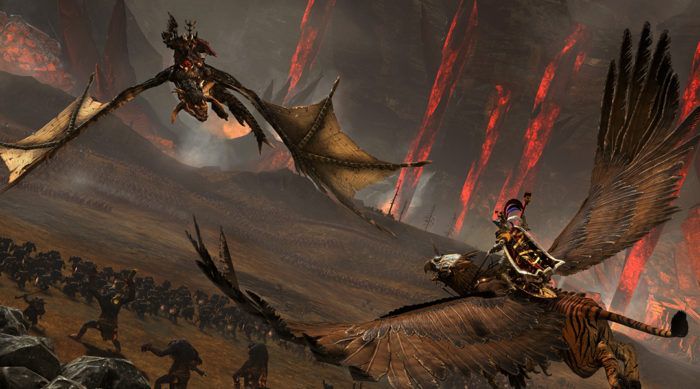
Total War: Warhammer Review
By Rob Gordon 26 May 2016
Total War: Warhammer manages to keep fans of both the Total War and Warhammer franchises happy, delivering excellent strategy gameplay and the best Warhammer video game to date.
When it comes to strategy games, the Total War series consistently stands as one of the most important franchises in the genre. With a heavy focus on the side of historical events, complete with a keen eye for accuracy, the series has found love from history buffs willing to partake in some of the most interesting conflicts in history. From the era of Napoleon Bonaparte through to a focus on the Roman empire, the Creative Assembly franchise has found a solid niche and stuck to it.
However, the series has taken a strong left turn with the development of Total War: Warhammer. Instead of building upon events from history, instead Creative Assembly has made the transition over to one of the most popular tabletop strategy games in the world. Warhammer, the fantasy wing of the acclaimed Games Workshop franchise, marks a significant difference of subject matter for the Total War series, but thankfully Creative Assembly has managed to combine these two very different worlds into one fantastic end product.
It’s most likely because of Creative Assembly’s very clear commitment to maintaining a strong balance between the two sides. Total War: Warhammer manages to toe a near-perfect line between fans of the main line of Total War games and tabletop gamers after an authentic Warhammer experience. The gameplay is fluid enough as a video game strategy experience to stop those unfamiliar with the tabletop game’s rules to feel excluded, but is more than respectful enough to the Games Workshop series the ensure that most if not all Warhammer gamers feel satisfied with the level of detail involved.

The Warhammer franchise has not always had the best track record when it comes to video games. In spite of a rich lore, a wide variety of characters and factions, and the ability to both play things out on either a minor scale or through entire galactic conquests, this flexibility of subject matter has rarely turned into something that has stood the test of time. Although there have been some good examples of Warhammer games, such as third-person shooter Warhammer 40,000: Space Marine, which based itself off the science fiction epic side of the franchise, all too often Warhammer games have become bogged down in shoehorning in unnecessary features, losing sight of both the original material and what it means to create an enthralling video game.
Thankfully, Creative Assembly manages to combine these two separate entities with aplomb. Those impressed by the cinematic trailer released in advance of the game’s launch will be pleased to know that the authenticity behind the character design and gameplay rings true in the final product. From a surface level, models move and act as fans of Warhammer might expect, while the sound design, both in terms of ambient battle noise, character voices, and dramatic score, is also very much on point.

This detail follows through into the gameplay itself, where Total War‘s regiment-focused strategy ties up perfectly with the original rules of the tabletop game. Although players of the original game will no doubt feel they have an advantage due to a knowledge of unit types, they will have to contend with the real-time strategy of individual battles, and the maintenance an empire as required in the game’s campaign mode – something that those who only play tabletop will not have had to do up to this point.
It’s in this campaign mode where Total War: Warhammer truly shines. The player is given a choice of four different factions to choose from, each with their own individual campaign. These range from the human Empire and Dwarven realm through to the hordes of Orcs (as showcased in the first gameplay footage released) and the Vampire Counts, while the Chaos Warriors faction is also available for pre-order customers or as downloadable content.
Each of these factions plays in an entirely different way. In terms of minute content, each faction has different units with their own strengths and weaknesses, be it in infantry fodder or in larger scale units such as the steam tanks of the Empire or the horrifying Terrorgheists of the Vampire Counts. Meanwhile, some factions will not have access or limited access to some powers, such as a lack of focus on magic use with the Dwarves.

This alone would be reason enough for players to find a deeply enthralling strategy experience, with the variety on show effectively meaning that each campaign feels like its own entire game. However, each faction also has its own overarching differences on a larger scale, too, with different objectives, minor factions to navigate, and even gameplay features such as the Orc faction’s Waaagh system. Throw in standalone lords acting as unique characters – many of whom fans of the tabletop game will recognize – and the success of this Creative Assembly title becomes clear for all to see.
As the game expands, management of the player’s empire – and not just simply taking on comers in each real-time battle – becomes a key part of proceedings. Here, it becomes abundantly clear that Total War: Warhammer has potentially expanded upon not only the role of Warhammer in gaming, but also the Total War series as a whole. Creative Assembly has not only maintained the quality of grand-scale growth in its games – it has almost certainly improved upon it.
All in all, then, the game is perhaps the first to truly tap in to the potential of Warhammer in the video game sphere – at least in terms of recent gaming generations. Of course, not everyone will be happy, and a wide number of factions from the wider tabletop universe are not available to play, including any of the Elf races or the Skaven, while the nation of Bretonnia only has a limited presence. That said, Creative Assembly has struck a very good balance between the factions made available in the game, so players are unlikely to feel too aggrieved by the snub of their personal favorite race.
Overall, Total War: Warhammer is both a fantastic addition to the Total War series, and to Warhammer in video games as a whole. A must for strategy fans, the title delivers a stunning high fantasy setting alongside thrilling large-scale battles and complex yet enjoyable empire building. Near-perfect, the game is most likely the best Warhammer video game to date, and one could even argue that it is also the best Total War game to ever be released.
Trailer
Total War: Warhammer is out now for PC, with a release planned for Mac and Linux in the future. Game Rant was provided with a PC code for the purposes of this review.
